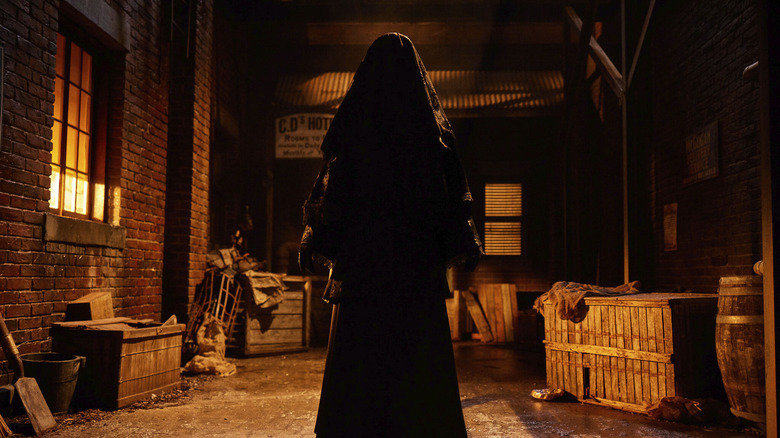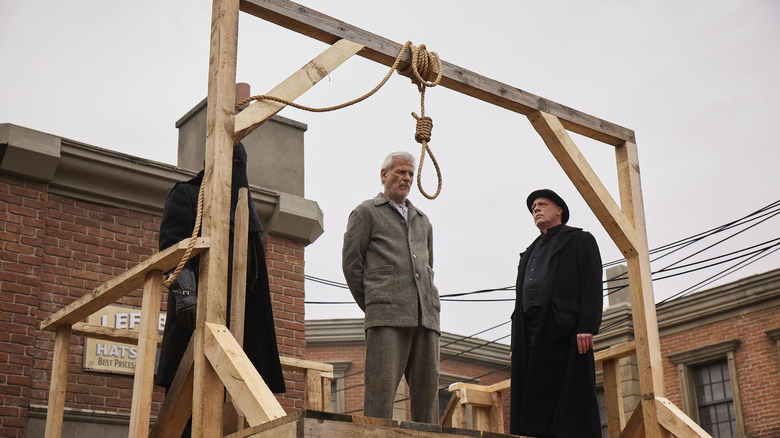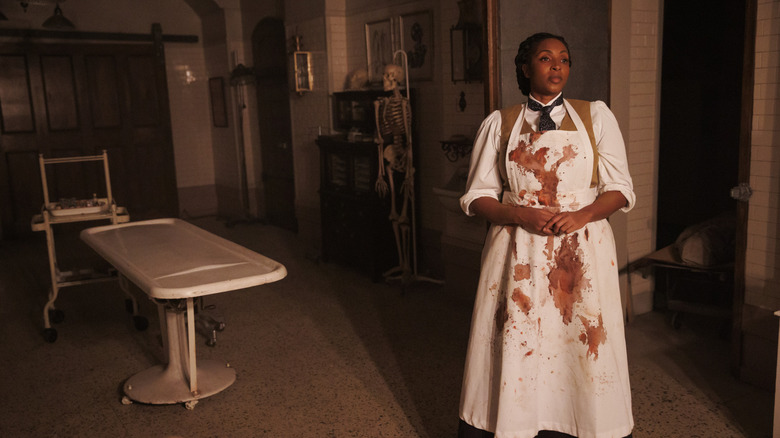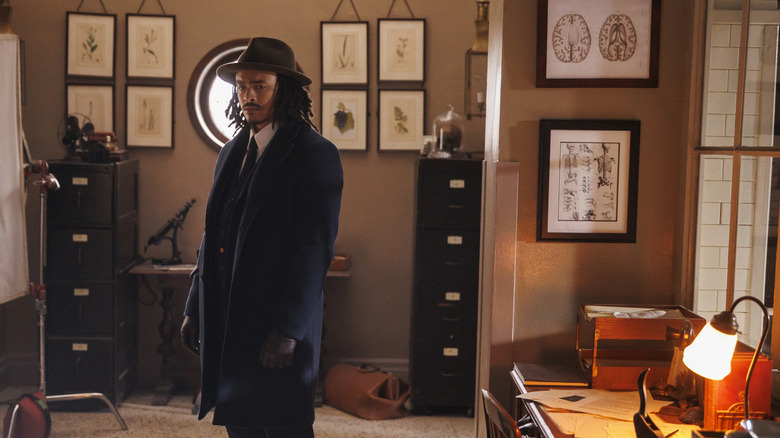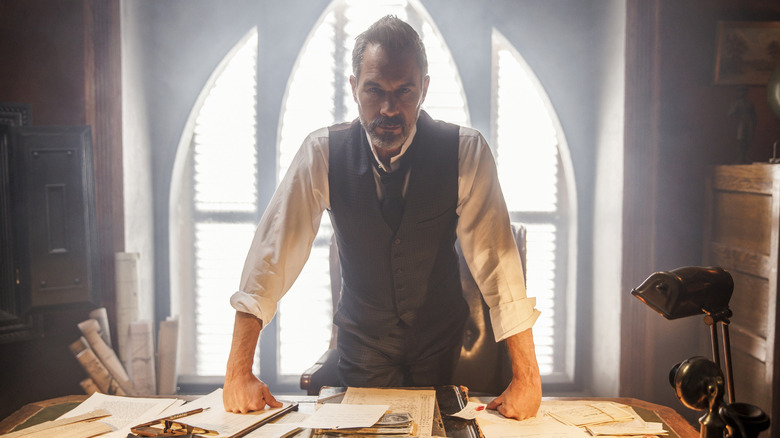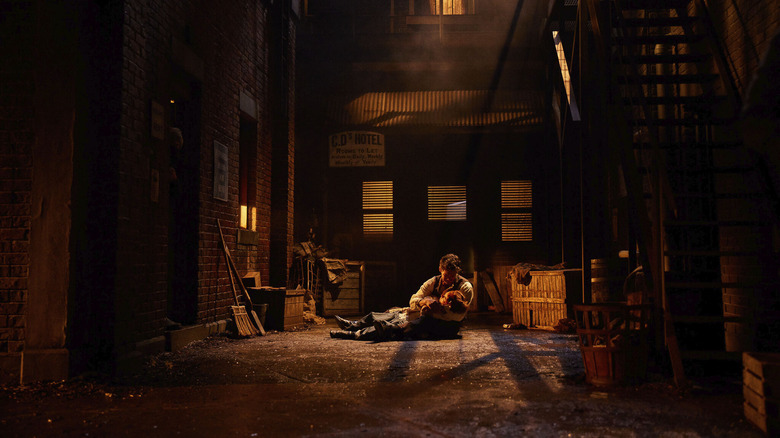Slasher: Ripper Review: Blood, Guts, And A Lot Of Heart
I have an opinion: "Slasher" is better than "American Horror Story."
Maybe that's not so controversial to say in 2023, when the popular horror anthology series created by Ryan Murphy hasn't had a good season in almost five years, and hasn't had a great one in over 10. "AHS" premiered in 2011, the same year that the sci-fi/technology-run-amok anthology series "Black Mirror" premiered. Curiously, though "Black Mirror" was just as popular, and was covered as furiously as "AHS" was in its prime, its influence on subsequent sci-fi visions seems to have jumped mediums to film. One can imagine pressing play on a new season of "Black Mirror" and watching films like "Ex-Machina," "The Circle," and "Vivarium," were a few minutes shaved off each.
"AHS," however, spawned a veritable renaissance in horror anthology series, from HBO's "Room 104," to Hulu's "Castle Rock," to Syfy's "Channel Zero." Before "AHS," you'd have to jump a decade back to the short-lived "Nightmares & Dreamscapes," another decade and a half to "Tales From the Crypt," and then make the veritable leap back to the golden-era smash that started it all, "The Twilight Zone."
For all its flaws, the tweaks "American Horror Story" made to the horror anthology series format that "The Twilight Zone" pioneered — letting stories play out for entire seasons rather than confining them to single episodes, introducing a stable of recurring actors who switch roles each season, dialing up the camp factor — were genius, and have held for the series which came after.
None have improved on those flaws more than Shudder's "Slasher." By no means is it a perfect improvement, but season five, entitled "Ripper," proves that even in its shortcomings, "Slasher" is entirely worth its weight in gore.
Origins of the slasher
The four previous seasons of "Slasher" have each taken on a different strain of the infamous horror subgenre of its title — the suburban stalker of "Halloween" ("The Executioner"), the summer camp teensploitation of "Friday the 13th" ("Guilty Party"), an urban paranoia/folk horror mix of "I Know What You Did Last Summer" and "The Wicker Man" ("Solstice"), and finally, a tropical nightmare a la "Club Dread" ("Flesh & Blood"). With so many slasher styles already picked through, where could the series go that still felt fresh? Back to the very bloody beginning.
"Ripper" is series producer Aaron Martin and showrunner Ian Carpenter's take on Jack the Ripper, the archetypal big daddy of the whole subgenre. The real Jack the Ripper terrorized the streets of Victorian London by visiting frequent, brutal violence upon its most vulnerable denizens: sex workers. Historians have come to unsettle that story in recent years, and "Ripper" fully subverts it by dispensing with its sex-worker slayer in the series' opening moments and installing an even more fearsome foe in his place.
In episode one, "The Slaughterhouse," we meet Alistair Simcoe (Shaun Benson), a lascivious, upper-class sadist who goes by "Jack" when he slums around Toronto's red light district (called "the Devil's Elbow"), looking for girls to torture. By episode's end, Alistair's been tied to a horse post and eviscerated by a mysterious figure clad in a mass of midnight black veils. The local rag nicknames her "The Widow," eliciting a wave of panic — but not from the city's poor and helpless. After every killing, the Widow leaves clues to indicate that she's after provincial Toronto's elite, a revenge quest for a terrible crime they covered up 12 years ago.
The ripped becomes the ripper
The very public murder of the once untouchable Alistair sets our expansive ensemble cast in motion — some to stop the Widow from visiting them next, others to make a buck off the panic she's created, and others just to survive the rough world of late 19th century, whether they're in the Widow's crosshairs or not.
The best argument you could make for a protagonist is Kenneth Rijkers, a novice detective played by season 3 alum Gabriel Darku. With the help of the doctor/undertaker Dr. Israel (Lisa Berry), erratic Superintendent Isaac Kashtinsky (Daniel Kash), and priest Andrew May Jr. (Steve Byers), Rijkers edges ever closer to the Widow as she slashes her way through her targets. Those targets turn out to be just about everyone else in the cast, in what turns out to be a kind of "Sweeney Todd"-ified take on "13 Reasons Why."
12 years ago, the innocent Margaret Mehar (Genevieve DeGraves) was discovered disemboweled in an alley, the culmination of years of torment and neglect that virtually everyone we meet contributed to. The season's tentpole casting accomplishment, Eric McCormack, plays a ruthless newspaper tycoon named Basil Garvey who sold Margaret to a brothel, but not before the Botticelli sisters, Viviana (Paula Brancati) and Venetia (Sabrina Grdevich) sold Margaret to him. The city's primary hustlers, Terrence Crenshaw (Christopher Jacot) and Horation Dixon (Jefferson Brown), were all too happy to accept. Garvey's ambitious editor-in-chief Enid (Jo Vannicola) printed the lies that led to the execution of the wrong killer, the magician Georges Rondeau (Thom Allison) humiliated her using hypnosis at parties, and so forth.
Practically everyone but Rijkers has reason to fear the Widow, which means they all also have the motive to be the Widow in order to silence their secret complicity by outing everyone else's.
Heart to spare
Listen, if we're still comparing "Slasher" to "American Horror Story," the latter has some obvious advantages which have vaulted it above the former in the public's estimation. Its budgets are far larger, FX always gives it a far more illustrious publicity rollout, it packs star power that "Slasher" can't ever compare to (even if they did get David Cronenberg on "Flesh & Blood"), and after ten years, the show has accrued an enormous amount of cultural cache.
But the humble Canadian series that started on Chiller, before migrating to Netflix, which has now found a stable home in Shudder, has one thing that no season of "American Horror Story" ever had: simplicity of conceit. When you start a season of "Slasher," you're introduced to all the characters that are going to get picked off one by one in the first episode. You're also introduced to the titular slasher, who will more or less remain the primary antagonist throughout. Martin and Carpenter aren't interested in taking viewers to other dimensions, introducing multiple, competing foes, or burning through every single character in a juvenile fit of bloodlust so that an entirely new cast has to be introduced halfway through (looking at you, "AHS: Roanoke"). They're simply interested in good old-fashioned bloody fun.
Even though the sets are decidedly constructed, the dialogue is sometimes questionable ("How on Earth could you possibly know that," Dr. Israel asks Rijkers about a strange knot found on a crime scene, to which he responds, "I'm curious about detective work everywhere"), and some of the performers are limited, the fact that every single thread is on track to tie neatly together (at least from the vantage point of episode 5) makes the show supremely enjoyable. And it has so much heart, you can't help but buy in.
The power of restraint
"Ripper" has a few particular strengths compared with its preceding seasons. There was a notable amount of supporting actors from season 3 who were brought on as principals for "Ripper." The standout from this crop is Lisa Berry, who plays the imperious yet empathetic Dr. Melinda Israel. Martin and Carpenter have done an excellent job making porous the line between good and evil this season, and though she hasn't been featured as the primary focus of an episode yet, no one lives more in the grey than Dr. Israel.
Swishing in and out of everyone's business in her permanently blood-soaked surgical apron, Berry plays Dr. Israel with a cannily engineered sense of openness and honesty. She portrays herself as a mere agent of the state, slicing and dicing to help the powers that be pursue justice, thus she's often aligned with one of the show's only unimpeachably moral characters, Rijkers. But several flashbacks indicate Dr. Israel is among the guilty party who played handmaiden to Margaret's ultimate destruction. Berry lights up the screen every time she's on it, making viewers puzzle out how culpable she's capable of being.
Another strength is the show's flamboyance. At first, "Ripper" struck me as not camp enough, as in a scene where the wicked Botticelli sisters spank their adult cousin Verdi (Sadie Laflamme-Snow). "Disease requires medicine," one glowers, "and I have the cure." The scene is over-the-top silly, but it's nearly smothered by the somber, whinging score. As the show's gone on, however, I've discovered that the series' restraint, it's holding back from full Lady Gaga vampire hotelier-levels of "AHS" camp allows viewers to invest more in the story and in the characters' various fates.
'Appearances can be decieving'
The final aspect of "Slasher: Ripper" that makes it a two-thumbs-up recommendation from me is the dialogue. Again, you don't feel the writers straining to insert a grabby pun or memeable quip into every scene — and that's what makes the truly outlandish lines really sing.
The most quotable queen in the series is in fact a drag queen (per Martin and Carpenter) named Salomé, played by Salvatore Antonio. One night, Salomé offers the amoral newswoman Enid a scoop she can't resist: compromising photos of Basil Garvey. "Print these and prepare to be shocked," she says. "And if you are a size queen, you won't be disappointed." "Do I look like an anything queen?" Enid asks quizzically. Salomé demurs, "Appearances can be deceiving," before delivering the incredible line: "Our dear Basil is most definitively flagranting his delecto with the most domineering dominatrix in these photos." What does it mean? Who cares. The team behind "Ripper" exercise the same kind of restraint around deploying the saucier, quirkier characters like these, so you savor the moments they're allowed to vamp.
It's not "Mindhunter," it's not "True Detective" — you don't come to "Slasher" to think deep thoughts. But you can earnestly engage in the material and get wound up in the mystery in a way that other horror anthologies, "AHS" chief among them, seem too impatient and trigger-happy to allow for. "Slasher: Ripper" is a totally solid television horror effort from top to bottom. Shudder has become a vital component of the contemporary horror landscape, and given this series' history with distributors, I hope it's finally allowed to settle into its groove here for a long, long time.
New episodes of "Slasher: Ripper" premiere every Thursday on Shudder and AMC+.
